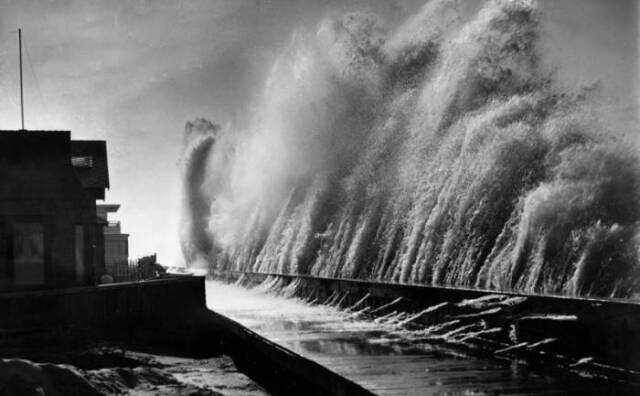The Ace Hotel in downtown Los Angeles is closing at the end of January, and with that the most recent chapter in the Spanish Gothic building’s storied past.
A spokesperson for the Ace Hotel, an international chain, told LAist that the owners of the building, which includes the Theater at Ace Hotel, will be converting the property to a “limited-service, rooms-only operation, managed via a tech platform.”
The location at 929 South Broadway has gone through many transformations, including an office conversion, an arts theater and a church. While there’s little known about what exactly the change will look like, it’s a marked difference for downtown.
The building’s history

Before it was a swanky hotel, it began in 1927 with a bit of a double life.
-
It's gonna be Yankees v the Boys in Blue
-
Nonprofit's launching fundraiser to keep it afloat
-
USC study documents what residents want from trees
It housed the California Petroleum Corporation office, later known as the Texaco Building, in the spaces above, and behind that, the United Artists Theatre. Business up front, party in the back.
United Artists had been created less than a decade before, when a group of film legends including Mary Pickford and Charlie Chaplin left the studio system to form their own company. It gave them total control over the creation and distribution of their work, and the downtown theater was their flagship film spot for West Coast showings.
The 13-story building’s Spanish Gothic design mirrored trends of the 1920s, and some of the decorations are copied from the Segovia Cathedral in Spain. Pickford put so much money into the theater’s design that the plaster cast molds had to be re-used in Detroit and Chicago to cut down costs.
Jesus Saves
In 1989, the property took on a new life. Televangelist Gene Scott acquired it to hold services for the University Cathedral Church until it moved out in 2011. He put giant neon “Jesus Saves” signs on the building, which had come from the Bible Institute of Los Angeles after it was torn down.
“Scott had bribed them, the demolition contractor, to take the ‘Jesus Saves’ signs back to their yard,” said Richard Schave, who leads historical tours around L.A. through Esotouric. “And he came and picked them up the next day. He saved the signs.”
One “Jesus Saves” sign is still on the downtown building, which has become a bit of an icon. The building was listed as a city historic-cultural monument in 1991.
The Ace Hotel’s arrival

After the church closed, the building was renovated and the office space was converted into a hotel.
The Broadway district drifted away from its polished, energetic roots after corporations moved in and the streets became run down. When the Ace Hotel arrived in 2014, the operators were interested in “reactivating” the theater as a focal point for culture in downtown.
-
The Ace Hotel has supported LAist in the past. Our newsroom maintains a firewall between our journalism and sponsorship teams, and the Ace Hotel had no control or input on the writing of this story
Since its stewardship, the Theater at Ace Hotel has held numerous big shows, including ones with the Sundance Institute and Cinespia. It’s hosted live reads and screenings like the Mad Men series finale. LAist has also participated in a number of public radio shows at the hotel.
Building ownership changed hands a few times but the Ace Hotel Group stayed throughout. While an Ace Hotel spokesperson declined to confirm the sale details with LAist, the building was reportedly most recently sold to an unnamed investor in November 2019 for $117 million. And through that time, the theater’s weird-yet-iconic “Cathedral of Our Lady Fingers” stuck around too.
Esotouric's Richard Schave and his wife, Kim Cooper, have led tours downtown for about a decade. During that time, they saw the area around the Ace Hotel change during former city councilmember José Huizar’s revitalization efforts, ‘Bring Back Broadway’ which started in 2008.
“It only worked down around the Ace,” Cooper said. “It created this sort of ripple effect where in the immediate vicinity of the Ace, things actually happened, as opposed to the dead zone from about — I think it’s 7th through 4th — where we just saw everything die.”
Cooper said they saw buildings get flipped and small businesses get evicted as new real estate moved in. She and her husband want to see the Broadway District revived to its former, busy glory.
What’s next
Downtown has largely been quiet since the pandemic as nearby offices go unused, so the departure of the Ace Hotel may not surprise some.
“We count ourselves fortunate to have made a home in Downtown Los Angeles for the past decade,” according to the hotel’s statement. “And while the neighborhood has been slow to recover following Covid, it was remarkable to be a part of the exceptional revitalization the area experienced during those years.”
With the Ace Hotel on the way out, there are unanswered details about the building’s future.
The theater will remain open, managed separately by an unnamed group. And there’s talk that the “tech platform” that will operate the hotel portion could be something like Sonder or Airbnb.
A spokesperson declined to answer whether the Ace Hotel Group would open another location in L.A.
“We’ll always have love for Los Angeles,” the hotel statement continued, “and look forward to sharing what’s on the horizon for the brand in the year to come.”
The Ace Hotel’s last day in the building will be Jan. 31.







